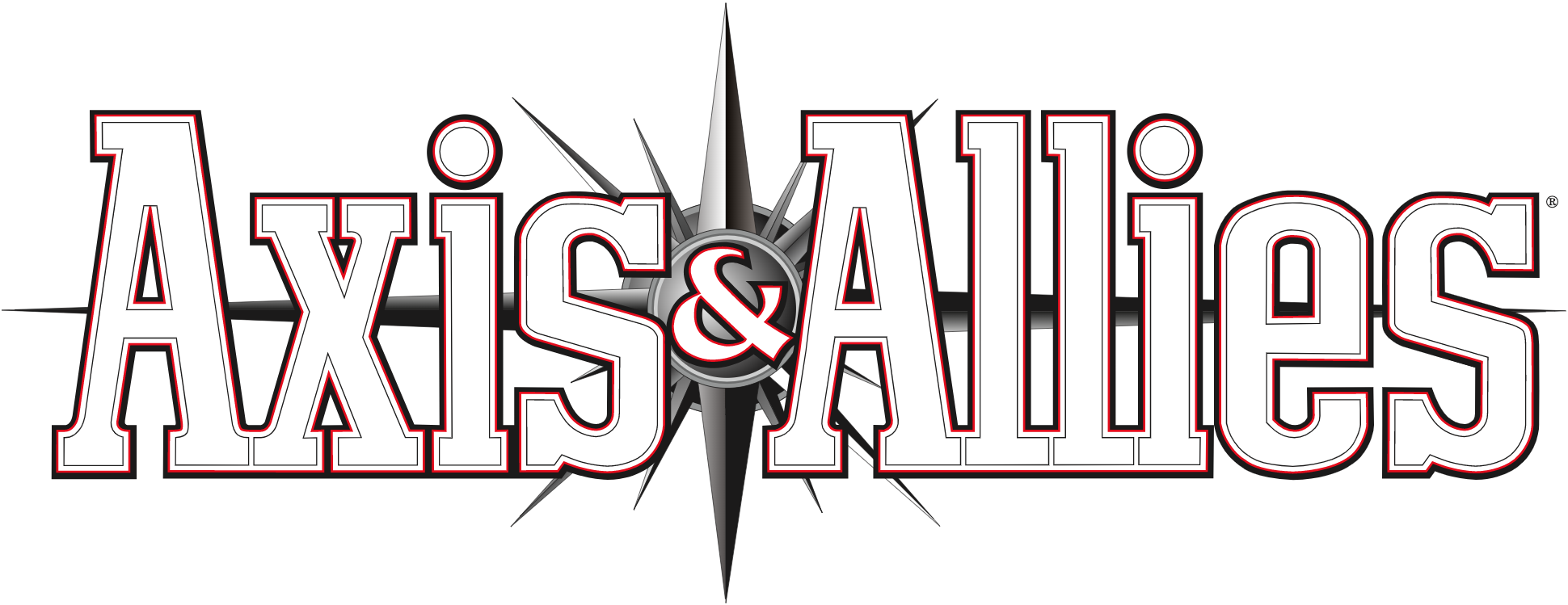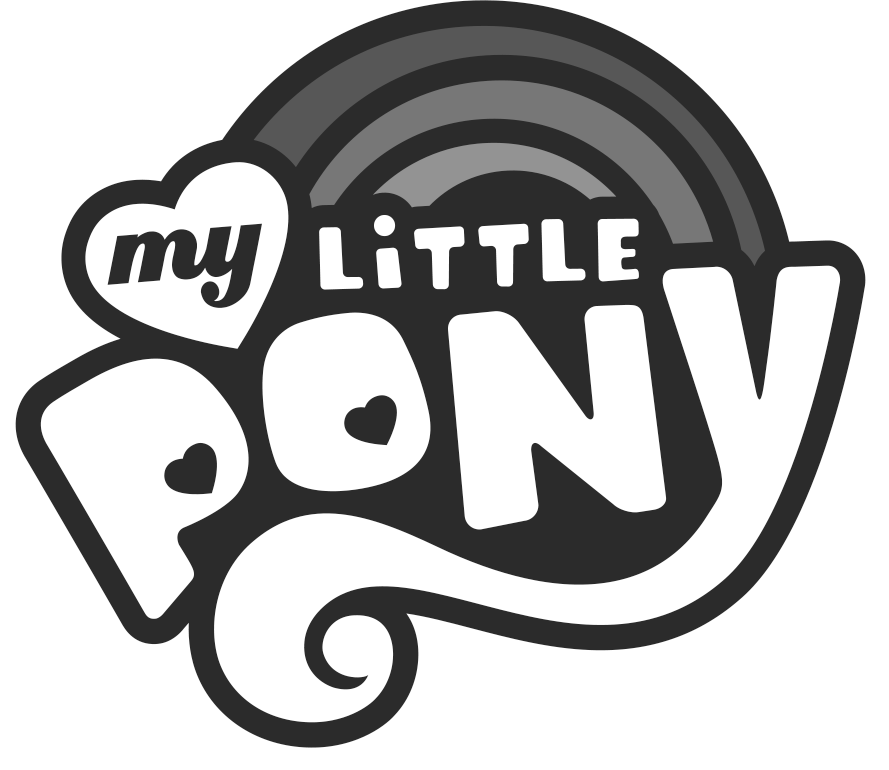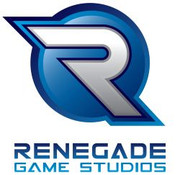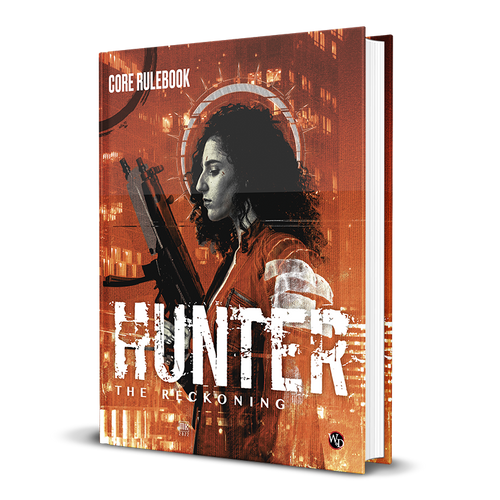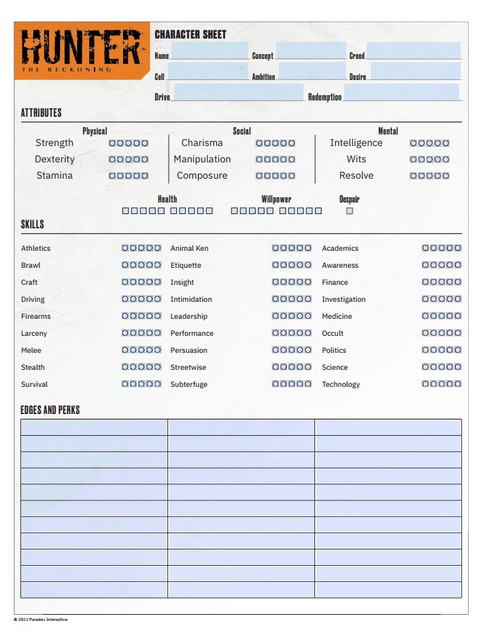The Renegade webstore offers worldwide purchases of digital items. If a cart contains only digital items checkout will not require a shipping address. Read our FAQ entry about PDFs and digital items here.
ENNIE Award Nominated Best Rules 2023!
A Storytelling Game of Desperate Measures
You saw what you shouldn’t have, the veil pulled back from the secret world and the monsters who prowl it. You chronicled the tragedies they wrought, these monsters, and the victims upon whom they preyed. You grasped the extent of their influence and witnessed the corruption of the organizations formed to keep them in check. And you vowed to do something about it. Tonight, you act. It’s time for a Reckoning.
Features:
- Hardback full color book with ribbon bookmark
- Introduces the Hunters of the World of Darkness for 5th Edition
- Features chapters on character creation, supernatural threats, and rival organizations
4 Reviews Hide Reviews Show Reviews
-
Excellent quality
I was honestly surprised by the quality of this book. I might actually buy a second for my players. Great craftsmanship
-
A dangerous World of Darkness for humans - a Mephisto review
The World of Darkness is a dangerous world full of monsters, conspiracies and threats that most humanity does not even suspect. But some people stumble into the truth - they see the monsters behind the scenes, notice the influence of dark forces, and realize the threat around them. Many do not survive this first contact with the monsters; others despair or suppress the truth. But for a few, their encounter with the supernatural world ignites an urge to stop being the prey of vampires, werewolves, and other horrors and take the fight to the creatures of darkness. These people become Hunters with a capital H. But these Hunters are not the only people who know about and hunt the monsters of the world of darkness. In fact, several large organizations - from the ecclesiastical Society of Leopold to the secret knowledge-gathering Arcanum to government organizations like the FBI's Special Affairs Division - also define themselves as hunters (although without the capital H). Unfortunately, because these organizations get lost in their own goals and are more interested in their own influence than in fighting the monsters, the Hunters are suspicious of them. The second role-playing game set in the 5th edition of the World of Darkness is, somewhat surprisingly, Hunter, which was not part of the five core systems in the original World of Darkness. As with Vampire, Hunter is a role-playing game that has been heavily adapted for the 5th edition (which is actually the 2nd Edition for Hunter). Just with Vampire V5, Hunter H5 has been given a new focus. While many themes and concepts fit with the old Hunter: The Reckoning, some aspects are also entirely different. The role of the Hunters The Hunters in Hunter: The Reckoning are, first and foremost, individuals who have their personal stories of how they came into contact with the mysteries and horrors of the World of Darkness. However, this encounter has always catalyzed something that the game calls a Drive - a motivation to hunt monsters despite all dangers. The second defining characteristic of Hunters is their Creed, which describes the basic approach to hunting from which certain advantages, the Edges, are derived. The first decision players have to make is choosing a Creed, of which five are available: the Entrepreneurial focus on innovation in monster hunting, the Faithful rely on their faith, the Inquisitive gather occult knowledge, the Martial concentrate on tactics and firepower, and the Underground uses cunning and guile. The Creeds are the analog of the Clans in Vampire, but are less formative. Although each Creed defines typical Drives, recommended Edges, and also the use of Desperation dice (see below), above all, they represent a general approach to hunting. Hunters with the same Creed can still be very different. While the Creed is the modus operandi, the Drive defines the motivation why a Hunter pursues his dangerous vocation: curiosity, vengeance, envy, and so on. However, the critical advantage during the hunt is provided by Edges, which come in several categories. Assets describe access to material things like weapons (Arsenal), vehicles (Fleet), explosives (Ordnance), and books and databases (Library). Aptitudes include talents to improvise equipment (Improvised Gear), penetrate computer systems (Global Access), pilot drones (Drone Jockey), or train animals (Beast Whisperer). Endowments are supernatural abilities to detect the monsters (Sense the Unnatural), drive them away (Repel the Unnatural), protect against their powers (Thwart the Unnatural), or use artifacts (Artifacts). Edges have no statistics and use other statistics for die rolls but can be enhanced and differentiated with Perks, with four Perks per Edge to choose from. The general character creation is based on attributes and skills with a range of up to 5 points, as usual for World of Darkness, which define the dice pools. There are also advantages and disadvantages to differentiate the character further. Moreover, Ambition and Desire play a role in character creation, describing the characters' big and small goals. Both are used in the regeneration of willpower. In addition, there are the Touchstones, humans that give the Hunters support and play a role in regaining willpower - a system that also appeared in Vampire V5. While more Touchstones may be helpful, each Touchstone is a potential target by the Hunter's enemies. The book presents a wide range of equipment to equip the Hunters, from simple tools like zip cuffs and Molotov cocktails to high-tech chaoscopes. The hunters are always organized in small cells operating independently. The large hunter organizations, or orgs for short, are suspect and corrupt from the Hunter's point of view, so the player characters are on their own. The orgs are usually not allies, but the secondary antagonists in the game, using the Hunters as cannon fodder when it fits their plans, or removing them as obstacles to their own goals. Some Hunters were part of the orgs and left when they realized the truth, but real Hunters will never join the orgs. Hunter cells ensure that Hunters are not completely alone in their fight and allow them to specialize - and they also provide a social network where they can interact with like-minded people. A lone Hunter would have little chance to fight against the World of Darkness monsters. Rules of the hunt The dice mechanics are the same as in Vampire V5. The unique feature in Hunter - and the equivalent of the Hunger Dice in Vampire V5 - are the Desperation Dice. Hunters have a Desperation counter of 1-5. Desperation indicates how desperate the Hunter's fight is, and the points can be used as additional dice when the Hunters follow their individual Drive. Desperation increases when bad things happen to the player characters and decreases when they succeed in their hunt. While the additional Desperation Dice initially provide an advantage, however, a 1 as a result leads to Overreach or Despair. Overreach increases Danger, another game statistic for the entire party, by 1. Despair causes the Hunter to become desperate and unable to use his Drive for the moment. Danger is a game statistic that the storyteller manages. Danger increases as the Hunters become targeted by their opponents. With Danger, the storyteller can strengthen the Hunters' quarry, e.g. by adding a number of bodyguards equal to Danger, or by having the monsters start a counterattack if Danger is high enough. Hunters and Hunted One chapter is devoted to storytelling and, in addition to plot structures, addresses topics such as planning tools for the chronicle, play styles, dealing with players, the importance of player characters, and more advanced techniques. The game emphasizes the role of Hunters as underdogs who are alone in the fight against an overpowered enemy that they must fight in secret. The next part of the book consists of supernatural threats. The book introduces vampires, werewolves, sorcerers, ghosts, fairy creatures and more. The game statistics and rules for the monsters are generalized for Hunter and simplified. Thus, a monster can have the Command ability to control victims - without differentiating between Dominate of vampires and corresponding other abilities and powers. While keeping the stats profiles simple and streamlined this way, the chapter takes time to present sample monsters, likely surprising not only the players but also the storyteller. Hunter does not present the monsters with the usual characterizations: vampire clans, werewolf tribes, traditions, sects, etc. - all these concepts do not matter here. Even with prior knowledge, the creatures can hardly be sorted into the usual categories. This approach offers the great advantage of providing the player characters with surprising and individual opponents here - be it a vampiric mannequin, a sorcerer who not only has a weapon at hand at all times but also masters it perfectly, or a deadly outhouse as a ghostly apparition. The orgs get a similarly comprehensive chapter, combining a wide range of old and new acquaintances like the SAD, the Arcanum, the Society of Leopold or the Orpheus Group with new powers like the Brazilian special police BOPE-RJ, the Manila Department of Justice: Special Rehabilitation Program or the start-up Monster-X. Finally, there are also a few sample profiles of the orgs' agents and other antagonists. The final chapter is once again about considerate play and techniques for making the narrative at the gaming table safe for all. The book also firmly distances itself from fascist and authoritarian attitudes. Conclusion Many significant changes stand out when comparing Hunter H5 to the earlier edition of the role-playing game. The elements surrounding the Imbued, Hunters who are themselves sent into battle by supernatural powers called the Messengers, and endowed with supernatural powers, no longer play a role in the game. While there are a few Hunters with supernatural powers, many Edges revolve around mundane advantages. Thus, the old Hunter ideologies are also missing. There are no significant groups or movements among Hunters. Nor does the Hunter Net exist as a communication node for them. In this respect, Hunter H5 breaks any metaplot continuity with the Reckoning-era Hunters. However, the core idea of the Hunters remains and is focused: Hunters work in cells of individuals who wage a desperate and unequal struggle against the monsters of the World of Darkness. It is striking that these monsters are not only portrayed outside the usual framework of the World of Darkness, but they are also fundamentally classified as evil forces. In particular, it is striking that the sorcerers are also portrayed as enemies of humanity, which strongly contradicts Mage's internal view. In short, everything that is supernatural is an enemy of humanity. On the other hand, large groups such as clans, sects, traditions, tribes, etc., do not play a role - the monsters always appear as individuals and not as part of larger groups. It is also striking that Hunter H5 portrays the organized hunters as the second set of enemies. While members of the SAD or the Arcanum used to be playable characters, they are now little better than the monsters themselves. The Hunters are completely isolated with this approach: they are on their own - all authorities and organizations will not help them and are part of the problem rather than the solution. While the showcase monsters and the orgs focus on an American setting, places like Brazil or the Philippines also introduced. From my point of view, a European perspective is lacking here. On the other hand, some ideas can be adapted to any setting or worked into a hunter campaign that takes the player characters around the world. The final rating of the book depends a lot on the starting point. Players who want to tie in with the old Hunter will find the changes too extreme and will not recognize the game. In addition, the background of Hunter H5 is quite different from that of the earlier Hunter: The Reckoning, and it also lacks any metaplot ties - both to the first Hunter: The Reckoning and to the current Vampire V5. For presenting the World of Darkness from the point of view of "normal" humans who are forced to fight a desperate and lonely battle against a world full of monsters and corrupt organizations, the book offers a strong setting. While the Edges are a bit vague, they do allow for a range of Hunters. Still, an Edge that allows to repel monsters feels quite different from a useful library. It is also striking that while the Hunger Dice from Vampire have been adapted as Desperation Dice with an interesting approach, on the other hand, Loresheets do not exist. The mechanism of the Danger also seems vague, while the Touchstones appear like a simple takeover from V5 instead of an adaptation to the Hunter setting. More focused and unique mechanisms would have worked better here. The book's design, with its consistent illustration style of using only orange as a color element, is quite successful. In addition, the description of the monsters and the orgs offers a lot of interesting game material which feels new and unique. This is especially true because the monsters have been fleshed out in great detail without simply taking concepts from the other systems. Thus, the book offers several opponents that will surprise players because they do not fit into the usual categories. While this offers the risk that classic WoD fans will miss exactly this cross-reference, from my point of view, it is coherent for a Hunter role-playing game that the players do not already know their enemies from other games, forcing them to prepare for each hunt individually. For those looking for Hunter simply as a role-playing game about humans in a desperate fight against the sinister forces of the World of Darkness, this is a reboot of the system that seems well worth playing. Especially for newcomers who do not know the canon of the game world and want to avoid deep diving into decades of lore and metaplots, the presentation offers a promising approach. It also allows WoD veterans to confront unknown enemies. However, those hoping for continuity with the Imbued and Messengers or canonical monsters and references to the metaplots of the other systems will not like Hunter H5, so presumably, one's perspective will dominate the game's rating. Since the old Hunter: The Reckoning was never my preferred system of the World of Darkness as I never really warmed up to the Imbued, from my personal view Hunter H5 represents an exciting and well-made role-playing game of the World of Darkness - even if the perspective presents a different World of Darkness, which, however, definitely fits the external view of the hunters. (Björn Lippold)
-
Hunter the Reckoning 5th edition
Loving this book so far. As much as I love Vampire being the underdog human fighting off the overpowered supernaturals gets me going!!
-
Inspiring
The idea of a monster-hunting RPG wasn't super interesting to me at first but there's enough concepts and inspiration in the book that I find myself eager to try running a game.

